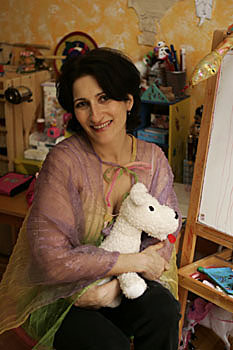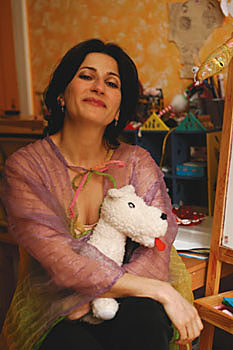Natalie Choquette: Diva and Devotee by Réjean Beaucage
/ May 14, 2005
Version française...
 The
saying “When a door closes, another opens” rings true for Canadian soprano
Natalie Choquette. A failed audition for the Atelier lyrique of the Opéra de
Montréal in the late 1980s allowed Choquette to focus on her own musical
personality. Now one of Canada’s leading musical humour personalities, Natalie
Choquette has acquired a more than enviable popularity in recent years. All of
the fictional divas she has created — Natalie Lipons, La Fettucini, La
Castafiore, Chiquita Choquetta, and others — have met with success wherever she
presents them. There is no arguing that her decision to blend opera and theatre
with humour and fantasy was a daring choice that might well have alienated both
opera purists and serious humour buffs. Yet her gamble has paid off. By making
use of her personal experiences to express her deepest aspirations, Choquette
successfully combines art and entertainment. The
saying “When a door closes, another opens” rings true for Canadian soprano
Natalie Choquette. A failed audition for the Atelier lyrique of the Opéra de
Montréal in the late 1980s allowed Choquette to focus on her own musical
personality. Now one of Canada’s leading musical humour personalities, Natalie
Choquette has acquired a more than enviable popularity in recent years. All of
the fictional divas she has created — Natalie Lipons, La Fettucini, La
Castafiore, Chiquita Choquetta, and others — have met with success wherever she
presents them. There is no arguing that her decision to blend opera and theatre
with humour and fantasy was a daring choice that might well have alienated both
opera purists and serious humour buffs. Yet her gamble has paid off. By making
use of her personal experiences to express her deepest aspirations, Choquette
successfully combines art and entertainment.
La Scena
Musicale met
Natalie Choquette to talk about the various influences that inspired her to
create the set of offbeat characters she carries in her theatre trunk from
South America to the Netherlands, and from Japan to Germany.
As the child
of diplomats, Choquette’s childhood was marked by frequent moves. Born in
Tokyo, she began her schooling in Lima, Peru. At six and a half her family
moved to Boston, at nine to Rome, at thirteen to Montreal, at sixteen to
Moscow, and at seventeen back to Montreal to finish her baccalauréat at the
Collège Marie de France. (On May 9 she’ll be performing a benefit there for the
college’s international foundation.) It’s no surprise to find her in a career
still travelling the globe. “It’s my karma,” she says, laughing. “That’s
probably why I’m completely at home in different cultural settings.”
It was in
Italy that Choquette felt the first stirrings of a vocation. “My father’s title
changed each time he was moved. In Rome he was the Canadian Embassy’s cultural
attaché. We had more opportunities than ever to see shows, but he always liked
classical music, while my mother was somewhat of a visual artist — a talent my
sister has inherited. Also, my father is a great storyteller, something that
greatly influenced my life, especially since the constant moves acted to bring
the family closer together.”
The young
Natalie was first attracted to theatre. “When I was very young my mother took
me to musicals. I was fascinated by the characters, the stage sets, and so on.
Later, in Italy, I saw Aïda, but already, hearing Italians singing in
the streets and waving their hands so theatrically in everyday conversation had
made me fall in love with the place. There was art wherever you looked. And I
was absolutely bowled over by the sound of opera. At the time, I dreamed of
becoming a vet, so I was thrilled to see elephants and horses in Aïda.
It all seemed like so much fun. After Rome, my father was transferred to the
Vatican. That’s of course, where I encountered sacred music, especially during
a Christmas mass celebrated by Pope Paul VI.”
Choquette’s
training continued at the Institut Saint-Dominique, where she was taught in
French. It was during this time that she discovered The Sound of Music.
Like opera, the film made her feel that pleasure and music were one. “I wanted
to play all the characters — the children, Maria, and the captain! I was
studying music with the Dominicans, who, of course, had a choir. I loved
singing, and it was here that I encountered ‘Soeur Sourire’ and ‘Dominique,
nique, nique,’ characters that I’ve sung about so much. We learned everything,
even grammar, through music. It helped me feel that things became more natural
through music. For our year-end show, I had the role of the Music Fairy.”
Leaving enchanting Italy for Montreal was hard, she says. “It was a paradise I
had to be torn away from and I sometimes feel I’ve never really completely
recovered!”
Back then,
Natalie was already trying out the family piano and taking over her sister’s
discarded guitar to sing Neapolitan songs and Beatles tunes. It was one of her
aunts who suggested that the fifteen-year-old have singing lessons. Her first
teacher was counter-tenor André-Paul Bourret. “He lived in the north end of
Montreal,” she remembers, "and it took me an hour and a half to get there — but
it was the highlight of my week.” A year later, however, her father was posted
to Moscow. Being in the grey, paranoid Moscow of the Brezhnev era meant having
a new music teacher and with her, a new, very physical method. “She (the
teacher) spoke Polish, Russian, and German, whereas I spoke French, English,
Italian, and Spanish. I had to record the lesson, and have my father translate
it in the evening.” Choquette admits that Moscow’s cultural life was worth the
move, and that, as a young student, she took full advantage of it. “I’ll never
forget Boris Goudenov at the Bolshoï,” she says. Although Choquette felt
a growing desire to take part in this fabulous ritual, she continued to find it
rather formal.
No
thought of a career
 Back
in Quebec once more, Choquette attended the Université de Montréal, studying
voice with Roland Richard. “I had no thought of a career and never went through
the rounds of auditions, except once, for the Opéra de Montréal’s lyric
workshop. I hated it! I’d rather sing in the shower than under those
conditions. I admire those who do it, but I’d have to have a different
personality. I don’t like being judged when I sing; I do it for pleasure, and
that’s what I want to transmit. “Her degree completed, Choquette had many
contracts singing in churches for weddings and other celebrations. Other
engagements (one in a clown’s costume) helped her develop her talent for
entertaining a crowd. In no time, Choquette found herself in the Opéra de
Montréal’s chorus singing in — of all things — Aïda! Next she tried
contemporary music in a Marie Pelletier work, and soon the word got around. Back
in Quebec once more, Choquette attended the Université de Montréal, studying
voice with Roland Richard. “I had no thought of a career and never went through
the rounds of auditions, except once, for the Opéra de Montréal’s lyric
workshop. I hated it! I’d rather sing in the shower than under those
conditions. I admire those who do it, but I’d have to have a different
personality. I don’t like being judged when I sing; I do it for pleasure, and
that’s what I want to transmit. “Her degree completed, Choquette had many
contracts singing in churches for weddings and other celebrations. Other
engagements (one in a clown’s costume) helped her develop her talent for
entertaining a crowd. In no time, Choquette found herself in the Opéra de
Montréal’s chorus singing in — of all things — Aïda! Next she tried
contemporary music in a Marie Pelletier work, and soon the word got around.
Reynald
Arsenault was one of the composers paying attention to the rising star. “He
helped me a lot, had me sing a Hallelujah composed for me. In the end I
recorded it on my first CD. I’m so proud to see it beside the Bach and Mozart,"
she exclaims. A few good reviews got things going. As luck would have it, Swiss
conductor-composer Pierre Huwiler was looking for a singer with solid
technique, yet able to handle pop phrasing. He asked her to sing in his Gottarde
for choir, soloists, and orchestra. Choquette also sang his Missa Alba with
the Montreux Orchestra, a performance that catapulted her into the oratorio
category, a repertoire which gives the singer stage fright. Still, she has been
receiving a steady flow of invitations to perform in Switzerland. After these
more serious concerts, Choquette trots out her theatrical talents with what she
calls her “brunch” repertoire to amuse her fellow performers. It was after one
such occasion that a colleague asked her to put together a cabaret show
featuring this Puccini-to-Gilles-Vigneault act combining popular songs with
operatic areas. The venture proved to be a great success.
Back in
Montreal in June 1992, Choquette’s talents were much appreciated in the gala
show Les Muses au Musée created for the opening of Montreal’s Museum of
Contemporary Art. For the occasion, she performed as the Muse of Pantomime,
improvising (“with an energy born of despair”) for the guests. Their laughter
exceeded all expectations, and not for the last time. Choquette’s various
incarnations of the eternal diva (she has nearly a 100 different ones) have
delighted many opera fans while simultaneously introducing the great arias to a
wide audience.
Choquette is
active as official spokesperson for the first Montreal World Choirs
International Festival (http://www.icmm.ca ),
designed to promote choral music. She will perform in the opening concert (St.
Jean-Baptiste Church, 8 pm) with works from her most recent CD, Æterna (ISBA,
ISB CD 5107). This recording produced by her partner, bassist Éric Lagacé, also
her musical director and arranger, doesn’t feature her “La Diva” characters,
but is instead Choquette’s tribute to her beloved sacred music. It is a benefit
project for the Quebec Cancer Foundation, for which she is also official
spokesperson.
Also in
May, Choquette will take part in the first Maestra (Women in Music) (http://www.maestramusique.ca
) Montreal festival where she will perform in its closing concert on May 8 at
the Salle Pierre-Mercure. Entitled “Merci ma soeur!”, the evening recognizes
the nuns who contributed so largely in the musical education of many Quebec
artists. A number of their compositions will be featured, and among them, some
surprises. Performing will be Alain Lefèvre, Louise Bessette, Lise Daoust, the
Claudel Quartet, Marie-Danièle Parent, Marie-Josée Simard, and Laurence
Lambert-Chan. Translated by Jane Brierley
Version française... |
|


